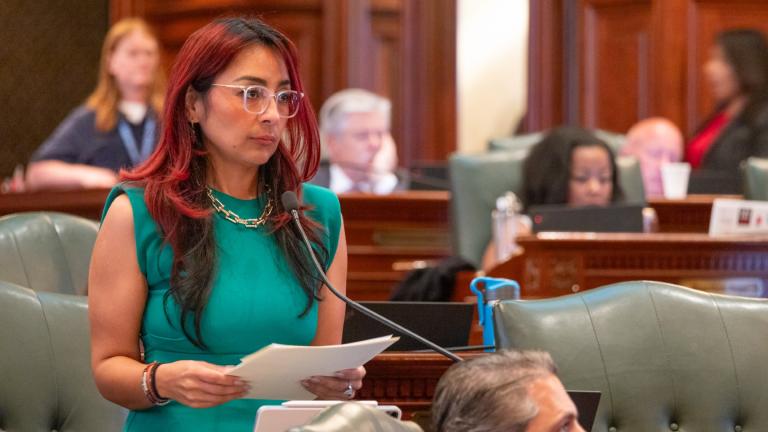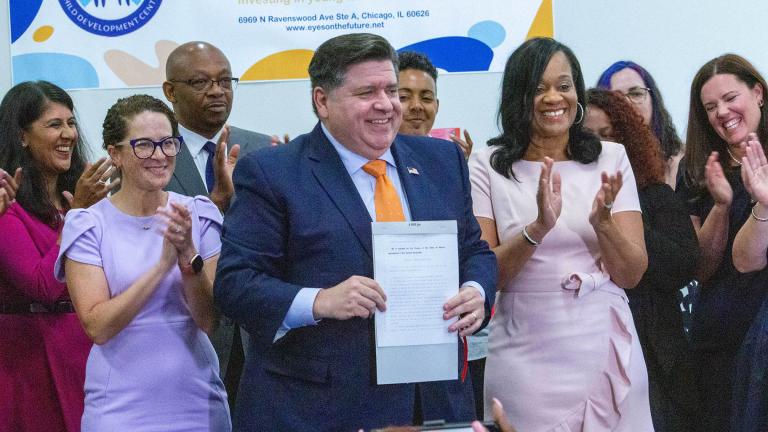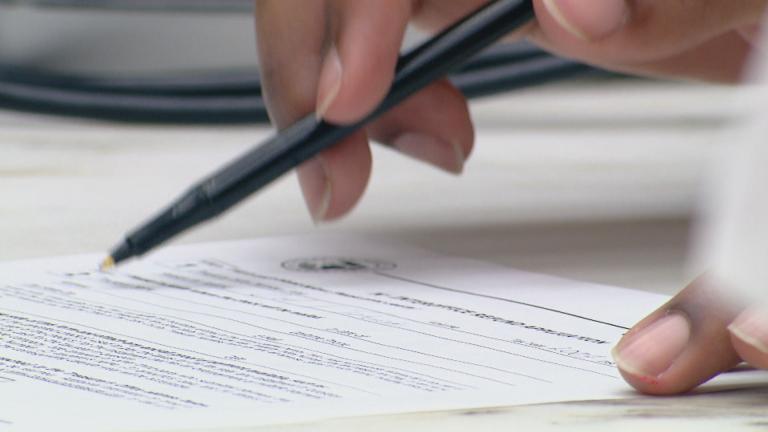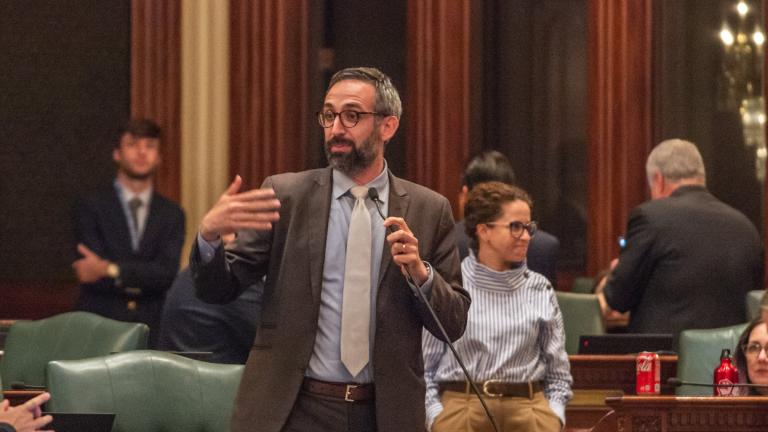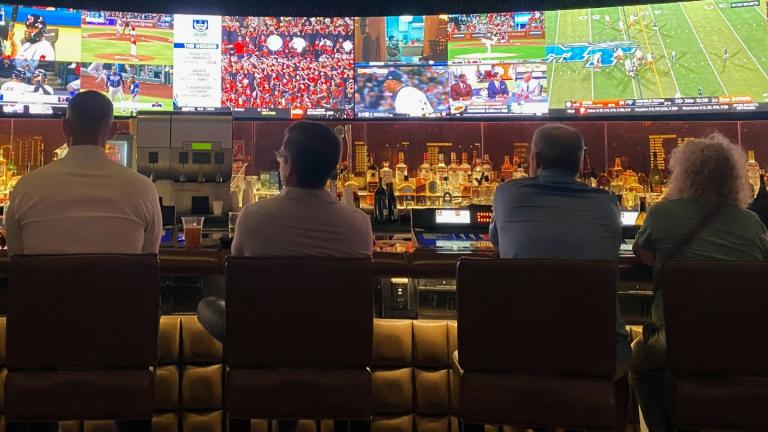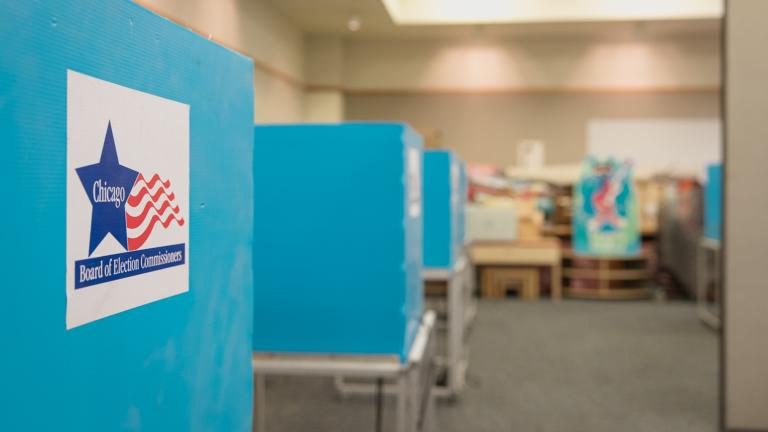 The Illinois State Capitol is pictured in Springfield. (Jerry Nowicki / Capitol News Illinois)
The Illinois State Capitol is pictured in Springfield. (Jerry Nowicki / Capitol News Illinois)
By Dilpreet Raju, Cole Longcor and Alex Abbeduto
Illinois lawmakers missed a self-imposed Friday deadline for passing a budget, but they had approved more than 250 bills this week as of Friday afternoon.
Amid the flurry of legislation was a measure prohibiting state universities from admitting students based on familial and donor ties, an expansion of the ban on sales of e-cigarettes to minors and a bill prohibiting stores from stocking alcoholic beverages near non-alcoholic lookalikes.
No More Legacy Admissions at Public Institutions
Senate Bill 462 would prohibit public higher education institutions from admitting applicants based on “legacy status” or relationships to donors, effective upon becoming law.
Such relationships, as defined in the law, extend from immediate relatives to in-laws, step relatives, half siblings, spousal family members, and engaged couples.
The bill also prohibits public higher education institutions from considering an applicant’s relationship to “any past, current, or prospective donor.”
It passed both houses unanimously and needs only a signature from the governor to become law.
Overdose Reversal Drugs
State agencies may soon be allowed to train and supply employees with naloxone or other opioid antagonists used to reverse overdoses.
House Bill 5028 passed both chambers without opposition and would solidify legal protections from civil liability for employees of state agencies that administer an opioid antagonist.
While the bill would allow state employees to administer opioid antagonists to anyone showing signs of overdose, it would not allow state agencies to hand out the overdose reversal drugs to the public.
Senate Bill 3779, which passed both houses, would allow licensed social workers to carry and use opioid antagonists as well. It instructs employers of licensed social workers to “establish a policy to control the acquisition, storage, transportation, and administration of opioid antagonists.”
Both bills are a signature away from becoming law.
K-12 Mental Health Care Screenings
Senate Bill 726 mandates the State Board of Education — along with the Children’s Behavioral Health Transformation Initiative and the governor’s office — to develop a screening for mental health care for K-12 students in public schools.
The legislation states the agencies must create “a tool for measuring capacity and readiness” to conduct mental health screenings of public school students by October. By next April, the agencies will be required to file a report to the General Assembly “on school district readiness and plan for phased approach to universal mental health screening of students.”
Another portion of the bill authorizes a pilot program for certified aides to work in the residences of youth requiring intensive care for behavioral health needs.
SB 726 passed the Senate unanimously before passing the House largely along party lines. It needs only a signature from the governor to become law.
Physical Therapy Access
House Bill 5087 would allow people to receive physical therapy remotely by telehealth — a service that was temporarily available during the COVID-19 pandemic.
Under the proposal, to conduct an initial evaluation via telehealth, a patient would need a referral, established diagnosis, or documented hardship such as geographical conditions. The provider must be able to offer in-person care in Illinois, which the patient can request at any time during their treatment.
The bill passed both chambers unanimously and needs only a signature from the governor to become law.
Alcohol Display
Senate Bill 2625 would prohibit stores larger than 2,500 square feet from displaying products containing over 0.5 percent alcohol by volume, such as hard drinks and whipped creams, next to their nonalcoholic counterparts. Stores 2,500 square feet or smaller would be required to post a sign notifying the customer that the product contains alcohol.
The bill passed both chambers unanimously and needs only to be signed by the governor to become law.
Subsidized Housing for Parents and Adult Children With Disabilities
Senate Bill 3351 provides that an elderly parent of an adult child with disabilities who lives in subsidized housing “shall not be required” to live in a one-bedroom unit.
House sponsor state Rep. Terra Costa Howard, D-Glen Ellyn, said the bill would align Illinois with federal guidelines by giving parents caring for “opposite-sex” adult children with disabilities separate bedrooms.
The measure needs only a signature from the governor to become law after passing both chambers unanimously.
Expansion of Underage E-Cig Ban
Lawmakers unanimously passed a bill to ban online sales of e-cigarettes and tobacco vape products to individuals under the age of 21, a rule that already exists for in-person sales.
State Rep. Natalie Manley, D-Joliet, sponsored Senate Bill 3098 in the House after hearing about high schoolers using incognito vaporizers that can be purchased online. The measure passed both houses and will need only a signature from the governor to become law.
“I call this diabolical genius marketing,” Manley said. “You can now buy vapes that look like Sharpie highlighters … and USBs.”
Business owners who violate SB 3098 can be punished with a $200 fine for the first offense, with each subsequent offense increasing by $200 up to an $800 max fine.
Senate Bill 2662 would ban vendors from marketing such products in a way that would “cause a person to mistake the electronic cigarette for a product that is not a tobacco product.”
It cleared the House unanimously on Tuesday and heads back to the Senate for concurrence with an amendment.
Headcount for Community Action Boards
Senate Bill 3793 changes rules regarding community action boards — diverse groups that connect community stakeholders and local businesses with political representatives — by changing the minimum number of required members from 15 to nine.
House sponsor state Rep. Laura Faver Dias, D-Grayslake, said these boards, which have operated nationally since the 1960s, supervise networks of community action agencies that distribute funds to individuals in need.
“Community action boards here in Illinois oversee the programs that really exist to help people who live in poverty,” Faver Dias said.
Sponsors said the current structure hinders the ability for some community action boards to achieve a quorum and effectively function. The new limit on board size would be 51 members, should the governor approve the legislation.
School Policy
Senate Bill 3571 would require schools to have automated external defibrillators on the premises during both the school day and during extracurricular activities.
These types of defibrillators are used to revive someone after they suffer from a sudden cardiac arrest, such as during a heart attack. They are already required in fitness centers and gyms, including those in schools.
The measure passed both chambers unanimously.
Capitol News Illinois is a nonprofit, nonpartisan news service covering state government. It is distributed to hundreds of newspapers, radio and TV stations statewide. It is funded primarily by the Illinois Press Foundation and the Robert R. McCormick Foundation, along with major contributions from the Illinois Broadcasters Foundation and Southern Illinois Editorial Association.

